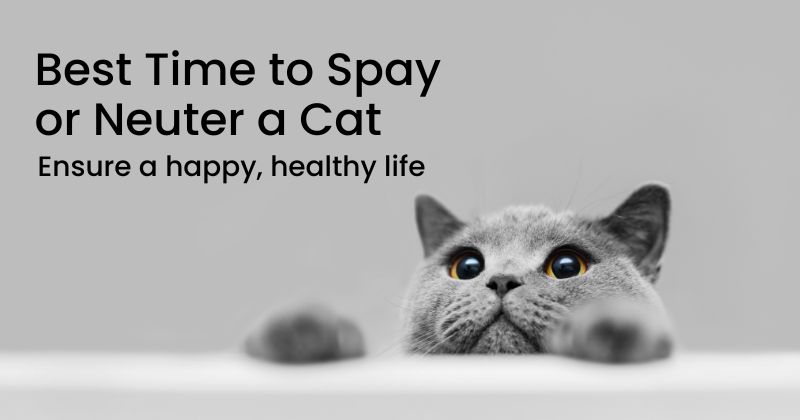
Deciding when to spay or neuter your cat impacts their health, behavior, and even the overall population of stray cats in the community. At Coventry Veterinary Clinic in Elkhorn, NE, we know that timing plays a significant role in the benefits of spaying or neutering. If you're unsure about the right time for this procedure, our goal is to guide you through the key factors to consider and help you make the best decision for your cat’s long-term well-being.
The decision is typically based on several factors, including the cat’s age, weight, and overall health. Many veterinarians recommend performing these surgeries when the cat is still young but after they’ve reached a certain developmental stage. This timing helps reduce the risk of unwanted behaviors, such as territorial marking in males and the chance of certain health problems, like mammary tumors in females.
Spaying or neutering a cat before six months of age can prevent many common issues associated with unaltered cats:
An optimal window for spaying or neutering a cat is between four to six months of age, as this is when the cat has developed enough physically to undergo the procedure safely but hasn’t yet reached sexual maturity. However, there are exceptions based on the specific circumstances of each cat.
For kittens, many experts recommend spaying or neutering before they turn six months old. By doing so, you can reduce or eliminate certain hormone-driven behaviors. Male kittens are less likely to spray and mark their territory if neutered early, while female kittens avoid the risks associated with going into heat. At Coventry Veterinary Clinic, we work with pet owners to determine the best time to schedule the procedure for their kitten. We consider factors like growth, development, and overall health, tailoring the decision to each kitten’s needs.
If your older cat hasn’t been spayed or neutered, it’s still beneficial to schedule a surgery to do so. While earlier is ideal, adult cats can still gain health and behavioral advantages from the procedure. Habits like spraying or aggression may be reduced with neutering, though surgery might carry slightly higher risks, especially for cats with health issues. Most adult cats recover well, and your veterinarian will assess their readiness based on their health.
Whether you are spaying or neutering a kitten or an adult cat, preparing for the procedure is important to ensure your pet’s safety. At Coventry Veterinary Clinic, we guide pet owners through the pre-surgery steps, which typically include a wellness exam and blood work to assess the cat’s overall health.
After the procedure, your cat will need a few days to recover. While the surgery is routine, it is still important to provide your pet with a comfortable environment where they can rest without disruption. At Coventry Veterinary Clinic, we offer detailed post-operative instructions to ensure your cat has a smooth recovery.
While some discomfort is normal, excessive pain, swelling, or discharge from the incision site should be addressed by your veterinarian immediately.
Your cat may try to lick or bite at the incision site. Use an e-collar or other protective device to prevent irritation or infection.
Keep your cat calm and avoid letting them jump or run around for at least a week after surgery. This helps prevent complications with the incision.
Spaying or neutering your cat is one of the most effective ways to promote a healthy, long life. Whether your cat is a kitten or an adult, taking this step can provide numerous benefits, both for their health and behavior. Coventry Veterinary Clinic in Elkhorn, NE, is here to answer any questions you may have about when to spay or neuter a cat. Our team is dedicated to helping your pet live a long, happy life, and we will work with you to determine the best time for this important procedure. To schedule an appointment or consultation, call (402) 819-2478 or request an appointment with our experienced team.
Closed daily from 12:30-1:30pm;
Wednesdays from 12:30-2:30pm


